Frank Wollheim
Sweden
 |
| Map of the German Confederation in 1860 |
What is in a name, and how does it come to us? This vignette shares the story of the son of a German gynecologist and how his impact influenced two medical students in 1918 Munich, eventually leading to the name of my mother’s first child—also a physician—Frank.
German-born American citizen and gynecologist Friedrich Wilhelm Wedekind (1816–1888) was born into a family of lawyers in what then was the kingdom of Hannover. He studied medicine in Göttingen and Würzburg, where he defended a PhD in 1839. In 1843 he graduated as MD in Hannover. Dr. Wedekind worked as a doctor for mining industries in several European countries, including Turkey, where it is said that he also served as the sultan’s physician.1 Later he practiced in Hannover. Being a determined supporter of the democratic movement in 1848, he joined the revolution as a liberal and was a delegate to the provisional parliament in the St. Paul’s Church in Frankfurt. The delegates cast a strong vote for a liberal constitution. But conservative forces eventually put an end to reform, and authors like Heinrich Heine and Georg Büchner went into exile in France and Switzerland respectively. Dr. Wedekind left Europe in 1840 for San Francisco, started a practice, and became an American citizen. In addition to practicing medicine he speculated in land and made a sizable fortune, helped by the California gold rush.
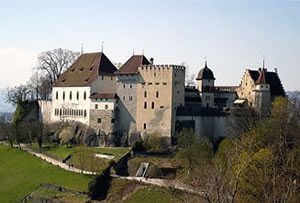 |
| Schloss Lenzburg Canton Aarau, Switzerland |
In 1862 he married an opera singer, Emilie Kammerer (1850–1915), who was twenty-two years his junior. Emilie was the daughter of a German industrialist, who like Dr. Wedekind was a democratic liberal. The Kammerer family immigrated to Switzerland for political reasons. In 1864, expecting their second child, the Wedekind family returned to Hannover in hopes that Germany would develop into a democracy. Shortly after arriving in Hannover on July 24, 1864, Benjamin Franklin—later Frank Wedekind, the famous poet, writer, cofounder of German cabaret, and actor—was born, named for one of Dr. Wedekind’s American heroes.
In 1866 the kingdom of Prussia defeated Austria in a brief war and swallowed the kingdom of Hannover (Fig. 1). Count Otto von Bismarck became the dominating politician, and a conservative society prevailed, dominated by the Prussian aristocracy. Having experienced the liberties found in the United States, Dr. Wedekind was again disappointed with Prussia’s lack of civil rights. In 1871, when Germany had defeated France and the king in Berlin was promoted to emperor of the united Germany, the family immigrated to Switzerland.
Dr. Wedekind bought the medieval castle Schloss Lenzburg for 90,000 Swiss francs in 1872. Situated on a hilltop in the Canton of Aarau, Switzerland, the castle (Fig. 2) traced its history back to 1077, with ownership passing through the hands of Emperor Friedrich Barbarossa (1173) and kings and dukes of the Habsburg family. After having passed through the hands of the city of Bern, housing a succession of Landvogts, the castle2 became the possession of private owners in the beginning of the 20th century.
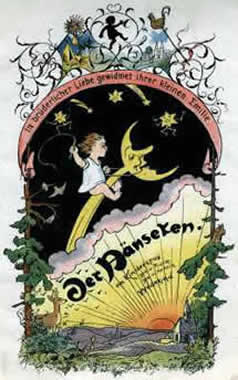 |
| Cover of Häneken, 1886 Art by Armin Wedekind |
Long before influencing the likes of Bertold Brecht and Erich Kästner, Benjamin Franklin grew up in this medieval castle, attending elementary schools in Lenzburg and high school in Aarau. In school he was more interested in reading poetry and novels than pleasing his teachers. Composing a set of poems, Descriptore in 1878, the following year he wrote a children’s book, entitled Der Hänseken, for his youngest sister Emilie. His older brother Armin provided the illustrations (Fig. 3). Published 18 years after it was originally written,3Der Hänseken is now a collector’s item, only recently republished in 2005 as a facsimile.
In 1881 Benjamin Franklin was temporarily taken from school and educated at home. In 1882 he returned to school in Aarau, where he participated in organizing a literature club. During this year a pupil in a class above him committed suicide, an event which 10 years later inspired his most famous play, Frühlings Erwachen: Eine Kindertragödie, translated as Spring Awakening: A Child’s Tragedy (Fig. 4).
Despite demonstrating obviously strong poetic talents, his father insisted that Benjamin, after finishing school, attend a university to study law. Benjamin spent two years in Munich where he indulged in literature and theater, but totally ignored law studies. This infuriated his father, who terminated the student’s economic support, forcing Benjamin to earn a living. He was employed by Maggi, a newly founded soup manufacturer, to write advertising texts and produced more than 150 entries in less than 18 months. In the summer of 1888, having reconciled with his father, he reluctantly started law school in Zürich. But in October of that year, his father suddenly died. Benjamin Franklin immediately gave up law school and returned to Lenzburg and to his real interests in life.
It was now that he changed his name to Frank. Supported by his inheritance, he left Switzerland for Berlin, where he befriended authors and actors, visited museums, went to the theater, and enjoyed culture in the growing city. His American citizenship prevented him from staying in Berlin, so he moved to Munich at the very time when modernism gained momentum there. He completed his play Spring Awakening here in 1891. Describing the passionate love story of two 14-year-old schoolchildren driven to their deaths by tyrannic and morally dishonest parents, this masterpiece retains all its engaging urgency even today. Immediately banned upon publication, the play was first performed in 1906 under the charismatic directorship of Max Reinhardt in Berlin. Again censored—this time after the opening night—the play’s ban was eventually lifted six years later. In 2006 it was staged as a musical and won several Tony awards.
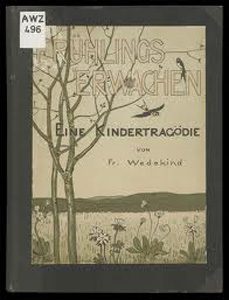 |
| Cover of Frühlings Erwachen, 1891 |
Frank Wedekind spent time in London and Paris in 1894 and made an acquaintance with the Danish author Georg Brandes, the German publisher Albert Langen, and the Swedish author August Strindberg. In 1896 Wedekind had an affair with Strindberg’s second wife, Frida Uhl. This resulted in the birth of an illegitimate son, Friedrich, who later became a liberal journalist in Berlin. During the Second World War Friedrich helped several Jews go into hiding.
Albert Langen founded the satirical journal Simplicissimus in Munich in 1896, and Wedekind became an early contributor, which would soon lead to conflict with the government. A poem making fun of Emperor Wilhelm II resulted in prosecution, and Wedekind, together with the cartoonist Thomas Theodor Heine, spent six months in prison. In the following years Wedekind continued to push the envelope in publishing his scandalous “Lulu” plays, Earth Spirit and Pandora’s Box, in which the femme fatale Lulu ruins one lover after another until she is murdered by Jack the Ripper. Characterized by a frank depiction of sexuality and violence, these plays inspired Alban Berg to compose his opera Lulu.
Frank Wedekind practiced “free love” for many years, but in 1906 he married Tilly Newes, an actress twenty-two years his junior, with whom he had performed on stage—she as Lulu, he as Jack the Ripper (Fig. 5). Abandoning promiscuity, he became an extremely jealous monogamic husband. The marriage produced two daughters. Frank Wedekind died prematurely of the complications hernia surgery on March 9, 1918.
At the time of Wedekind’s death, the shared admiration of Frank Wedekind by two medical students in Munich would eventually impact me—14 years later. Bertold Brecht had become a medical student in 1917 in order to avoid military service, while Hedda Kuhn had been urged by her father to study medicine for economic reasons, as he had lost most of his money invested in German “war loans” (Fig. 6). Bertold and Hedda, referred to as “He” in Brecht’s diary,4 shared a preference for the humanities over medicine; close friends for some time, they promised their first son would be named Frank.5 Both lived up to their promise, but fortunately, the relationship did not last long. Brecht had an affair with Paula Banholzer, “Bi” in his diaries, who in 1919 gave birth to his son called Frank Banholzer.4 Bi was only 16 years old at the time. Brecht offered to marry Bi, but her father, an Augsburg physician, refused to accept him as son-in-law, and Brecht soon married another woman. The unfortunate Frank Banholzer ironically died as a German soldier in 1943. In 1932 exactly 14 years after Frank Wedekind’s death, I was born in Berlin as the first son of Hedda, who married my father Ernst Wollheim in 1922. My parents never told me the story behind my name, but I found out from reading the book on Brecht.5
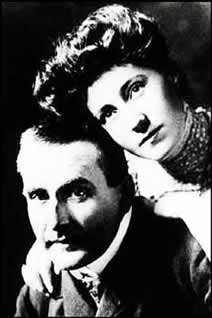 |
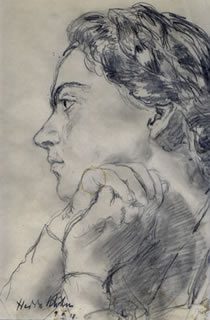 |
| Frank Wedekind and Tilly Newes |
Hedda Kuhn, 1918 Artist unknown |
Inspiring authors like Bertold Brecht and Erich Kästner, Wedekind’s legacy endured, and like Brecht and Kästner, Wedekind’s work was banned during the Nazi era. Frank Wedekind was an important artist and a forebearer of expressionism in literature. He deserves to be read and remembered. One must dislike Frank Wedekind’s erotic escapades, but nevertheless I am proud to be named after such a man of courage who stood up for what he believed to be right, just as his father did before him—and his son with Frida Uhl after him. Perhaps it also influenced me to speak up against misbehaving colleagues and administrators, even when it risked being punished. And perhaps it has unknowingly made me a better advocate for my patients. The following lines are a poem from Pandora’s Box, which I tried to translate into English.
Was schiert mich das Theater! Unsere kühne
Tagtäglichkeit erreicht’s bekanntlich nie.
Das menschliche Gehirn sei meine Bühne,
Mein Lieblingsregisseur die Phantasie.Why should I care about the theater? It never
Equals our daily life’s exiting fevers.
I make the human brain into my stage,
My favorite producer is the phantasy.
Notes
1. Vinçon Hartmut, Frank Wedekind, (Stuttgart: J. B. Metzler, 1987).
2. Today Schloss Lenzburg is a museum boasting to be one of the most impressive midieval castles in Switzerland.
3. Frank Wedekind, Der Hänseken: Ein Kinderepos, (Atlantis: Brochere, 1961).
4. Bertold Brecht, Tagebücher 1920–1922: Autobiographische Aufzeichnungen 1920–1954, (Suhrkamp, 1975).
5. Werner Frisch and K. W. Obermeier, Bertold Brecht in Augsburg, (Aufbauverlag, Berlin and Weimar, 1975).
FRANK A. WOLLHEIM, MD, PhD, FRCP spent two years at the University of Minnesota from 1963–1965. He was professor and chairman of rheumatology at Lund University from 1981–1997, where he is currently an emeritus professor. He co-edited the Oxford University Press textbook Rheumatoid Arthritis and is a master member of the American College of Rheumatology.
Highlighted in Frontispiece Winter 2013 – Volume 5, Issue 1
Winter 2013 | Sections | History Essays

Leave a Reply